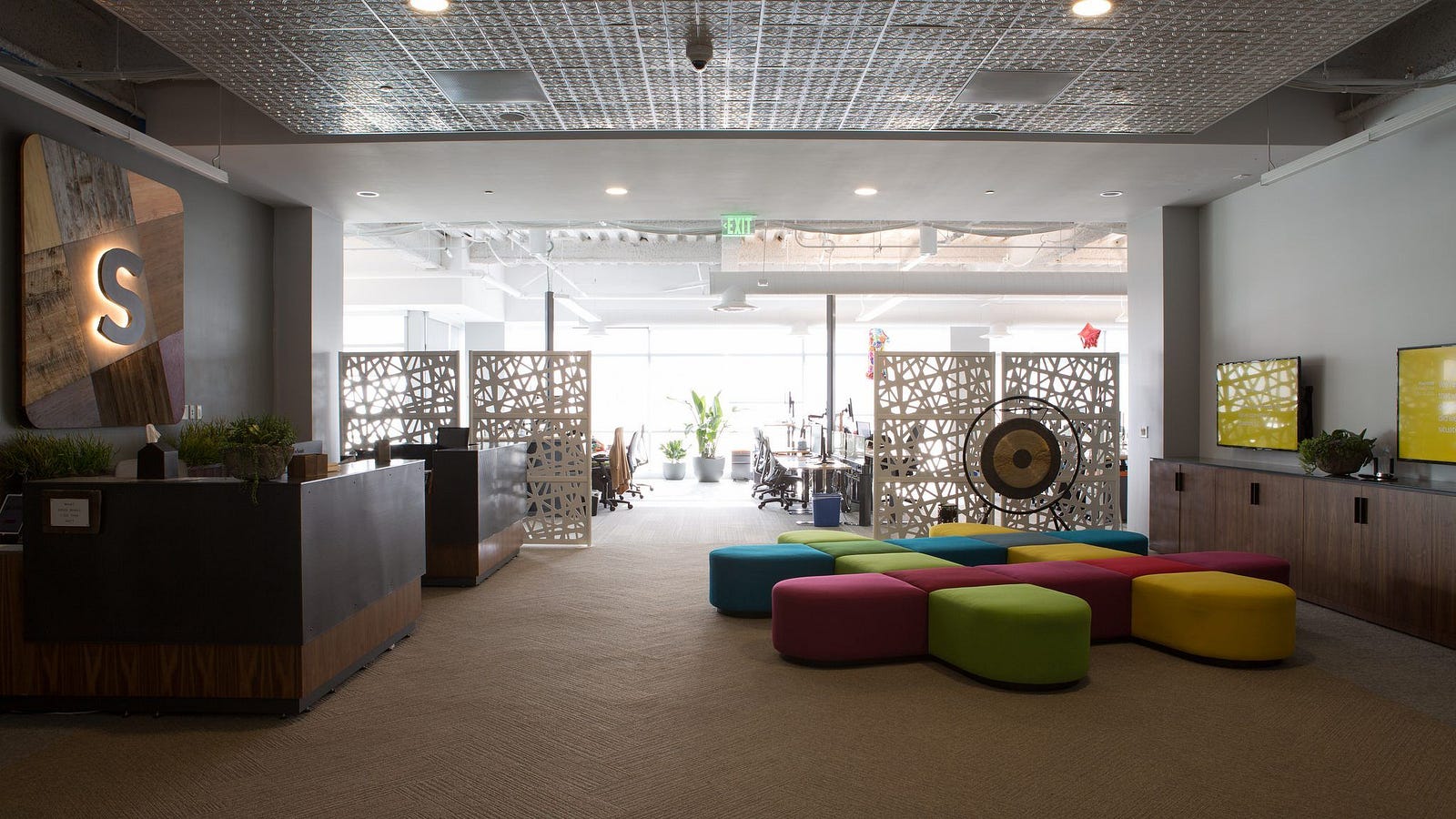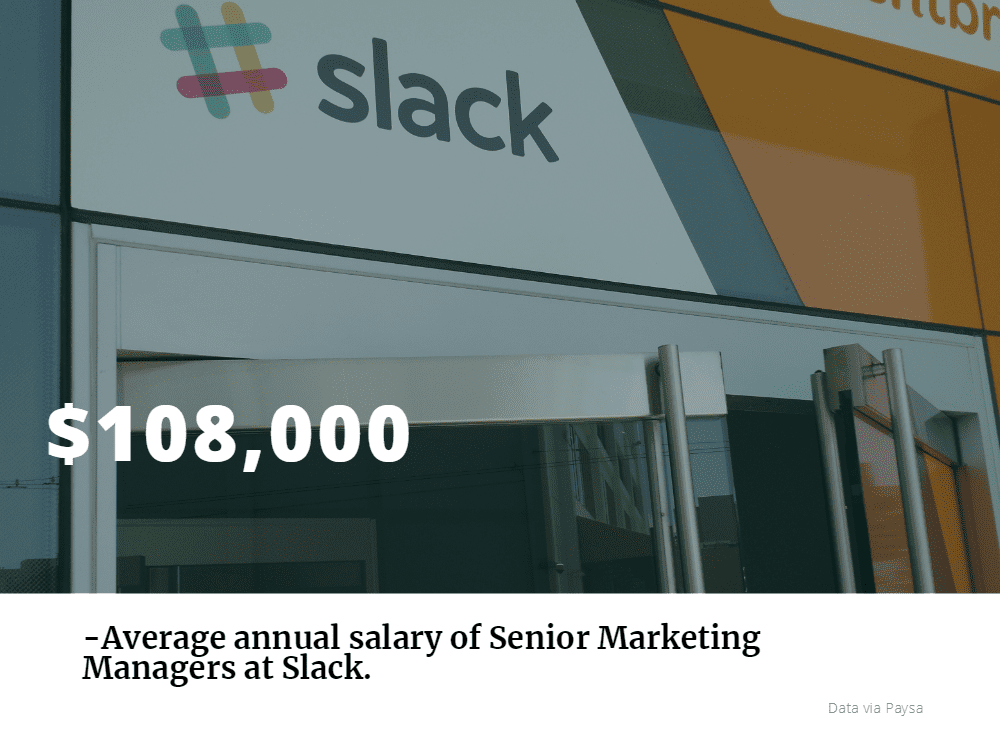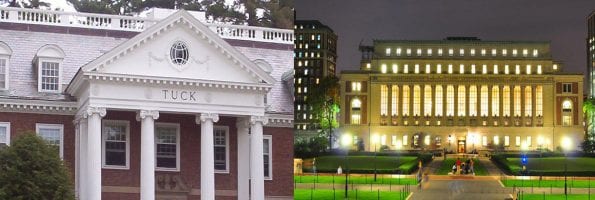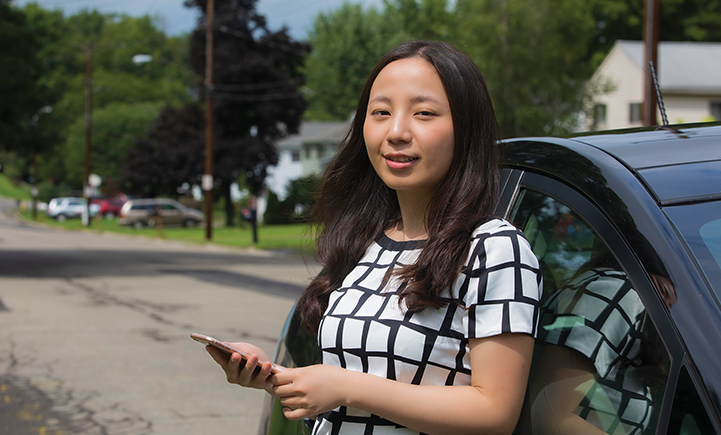Top MBA Recruiters: Slack

In a job landscape continually dominated by newer tech companies, many MBAs have chosen a tech-focused specialty in their future career plans. Among the companies with the greatest need for MBA talent are those that are in growth stages. Founders of startups or early stage ventures are not always certain of how to manage the finer points of finance, marketing, project management, and accounting. As they grow, so does their need for strong MBA candidates to attend to these details.
Tech companies specializing in cloud-based collaboration software are always on the hunt for new talent. Slack, Inc., for example, is a leader in a growing field of these communication tools, and its popularity is soaring. Here is a look at how and why a Slack career might be a wise front-runner on your job wish list.
The History of Slack, Inc.
Founded in 2013, Slack is still a relatively young company. Its recent acquisition of the assets of Atlassian’s enterprise communication tools in 2018 speak to its prevalence. With Slack, employees can chat with one another and form discussions around topics and groups, all with the goal of making connection with your peers easier and more direct. All chats are searchable which makes for a dynamic storage system for companies of all sizes.
Seeking a Slack Internship?
On its University Recruitment site, Slack boasts that joining “fosters curiosity and celebrates creativity in an effort to help everyone—here at Slack and around the world—do their best work,” (which incidentally is one of the company’s motto’s.) By assigning interns to project teams that tackle real assignments, Slack prepares future employees for life at the company. Internships take place over a 12 or 16-week session during the summer or fall, with application deadlines in May and August. If an application is accepted, Slack offers a phone or video interview along with a take-home assignment before coming to a decision.

Those looking for an internship in the tech world should seek out Slack’s San Francisco headquarters.
Each intern is guided by a mentor, and can connect with executives and team leaders on a daily basis. Outside of the office responsibilities, Slack offers interns volunteer opportunities and networking as you build your resume. Currently, Slack’s San Francisco headquarters is seeking a Sales Strategy Intern. Ideally, candidates for the position will possess several years of prior management consulting experience, and will receive their MBA in 2020.
Applying for a Slack Career
One of Slack’s greatest assets is its diversity. According to a recent article in The Atlantic, “Slack has been outperforming other Silicon Valley companies, [in diversity of its workforce]. At Google, Facebook, and Microsoft, women hold between 19 percent and 28 percent of leadership positions … At Slack, women make up 31 percent of leaders and hold 34 percent of technical roles. Also … percentages of underrepresented minorities … are, in some cases, triple that of peer companies.”
This alone makes a Slack career appealing, but additional benefits are numerous. The company gives each employee $500 a year toward personal development, and $2000 annually toward professional development. One hundred percenter of health care expenses are covered for employees and their families, and $150 per month reimbursement for fitness/wellness memberships. Slack gives its workers “generous parental and new child bonding leave”.
Massage therapy, catered lunch and breakfast, game nights, and a ‘meeting-light’ culture round out the list of the company’s appealing perks.
Currently, there are close to 200 open positions at Slack both in the U.S. and abroad. Here is a look at just a few.
San Francisco
- Business Intelligence – Marketing and Business Intelligence – Product
- Data Scientists for Lifecycle and Product
- Corporate Development Manager
- Business Development Manager – Platform
- Various Accountancy Positions
New York City
- Business Intelligence Analyst, Product
- Sales Operations, Deal Strategy Lead
Denver
- Senior Systems Analyst
- Sales Operations, Senior Commissions Analyst
In Tokyo, Slack is seeking a Partner Manager, Systems Integrator Alliances along with a Head of Enterprise Marketing. In London, there is an open position for a Senior Analyst Relations Manager, and the Dublin office is in search of Accountant, along with a Customer Experience Specialist.
Slack Career Salaries
According to data gathered by Paysa, Slack’s San Francisco office pays an average of $183,997 per year. This falls within a range of $126,305 to $222,941. A breakdown of the average is as follows: $132,038 base salary; $34,566 in equity; $17,392 annual bonus, and a $9,641 signing bonus. For specific positions more in-line with MBA talent, a senior marketing manager earns an average base salary of $108,000

For a full listing of Slack’s current open positions along with application instructions, visit the careers site.
School v. School: Dartmouth Tuck or Columbia Business School?

It’s tough enough to decide exactly where and what you want to study. But when prospective b-schoolers begin to weigh less tangible but equally important factors like reputation, alumni network, and return on investment, that’s when the MBA selection process really becomes daunting. This is especially true when you size up two MBA programs of comparable stature.
We’d also argue that’s where the process becomes interesting. So don’t fret! Let our School v. School series to do some of the heavy lifting for you. See below for our blow-by-blow comparison of two reigning champions of business education: Dartmouth’s Tuck School of Business and Columbia Business School.
Dartmouth or Columbia: What is Right for You?
Dartmouth College Tuck School of Business
Tucked … away in a small, rural campus in Hanover, New Hampshire, the Tuck School of Business boasts a tight-knit student body and an intimate setting. Over half its student body lives in campus housing, and MBAs belong to small group study teams that convene at the start of their programs.
Tuck consistently ranks among the top business schools in the country. U.S. News and World Report ranks Tuck 8th in management and 10th overall. Tuck offers a traditional full-time, two-year MBA with a variety of concentrations, as well as several short-term executive education programs.
Why Tuck?
- The Advanced Management Program offers “a transformative experience for senior business leaders who seek to innovate, drive growth, and create value.” The Minority Business Programs focus on guiding business owners as they “adjust their strategy, refine their operations, and build their enterprises to scale.”
- Additionally, Tuck offers two programs designed for non-traditional b-schoolers: the Business Bridge Program is a four-week intensive mini-MBA program for liberal arts students. Next Step is two-week program for military veterans and former athletes.
- Tuck is known for its community, with a focus on personal connections, including self-initiated interviews, accessible faculty, and a generous alumni network.
What Is Missing?
- The opportunities that come packaged with a major city and business hub are missing from Tuck’s rural setting.
- While Tuck’s tuition is roughly $5,000 more than Columbia’s, its total costs are $110,173—over $1,200 more than Columbia’s per year.
Tuck vs. Columbia MBA Rankings
| Publication | Tuck School of Business | Columbia Business School |
|---|---|---|
| U.S. News & World Report | 10 | 9 |
| The Economist (Global) | 12 | 11 |
| Financial Times (Global) | 15 | 9 |
| Forbes | 5 | 6 |
| Bloomberg Businessweek | 19 | 7 |
Columbia Business School
Located in the heart of New York City, Columbia Business School—like Tuck—is one of the oldest in the country. Unlike Tuck, Columbia students are in immediate proximity to highly coveted networking, partnership, and placement opportunities of a global business hub.
Columbia’s Programs
Columbia also routinely ranks among the top b-schools in the country—10th in management and 9th overall. Columbia also offers a full-time two-year MBA with various concentrations, Executive MBA, Doctoral Program, an accelerated MBA, multiple Masters of Science options and Executive Education Programs.
Why Columbia?
- The Executive MBA Program offers a traditional MBA program but on a schedule that accommodates full-time employment.
- The Doctoral Program offers a Ph.D. in multiple disciplines and “prepares individuals who have a deep interest in shaping the business research and policy of tomorrow through academic research.”
- First-year students can apply for admittance into the Value Investing Program where they learn to identify, value, research and manage investments.
What Is Missing?
- Columbia is reported to have an intimidating 17 percent acceptance rate—compared to Tuck’s ever-so-slightly more accessible 23 percent
- Only 18 percent of Columbia’s faculty members identify as women, compared to 23 percent at Tuck—both reflect a shamefully low national statistic.
Tuck vs. Columbia MBA Cost Per Year
| Dartmouth Tuck School of Business | Columbia Business School | |
|---|---|---|
| Tuiton | $72,150 | $67,532 |
| Full-Cost | $110,173 | $97,580 |
Both MBA programs are among the most elite in the country, and offer some pretty appeasing salary possibilities.
Tuck vs. Columbia MBA Salary
| Tuck School of Business | Columbia Business School | |
|---|---|---|
| MBA Graduate Salary Range (2018) | $60,000-$215,000 | $52,000– $308,000 |
| MBA Graduate Median Base Salary (2018) | $130,000 | $130,000 |
With comparable tuitions, post-graduate salaries, and employment rates, they contrast most when it comes to class size. While Tuck promises a secluded and intimate B-school setting, it’s tough to beat Columbia’s location in a global financial capital.
For additional insight, be sure to check out the news at both Tuck and Columbia.
Pfizer Helping Expand Rutgers, and More – New York City

Let’s review the most interesting stories to emerge from New York business schools this week.
You Were a Finalist City, but Didn’t Land Amazon HQ2? You Still May Benefit – Simon Business School News
While large companies have been increasing in size, there has been a steady decline in entrepreneurship over the past 30 years. However, new research from the University of Rochester’s Simon Business School explores some of the surprising benefits that large companies may have for entrepreneurs.
Graduate student Zhao Jin studied entrepreneurial activity in the 20 finalist cities that were considered for Amazon HQ2 and discovered start-up companies were about 7 percent more likely to incorporate in one of the finalist cities for Amazon.
“The mere possibility of a large company entering a market encourages entrepreneurs to find profitable ways to be useful to that company. The main effects are concentrated in the larger cities, like Atlanta, Pittsburgh, Denver, and Los Angeles, where the sample size is larger.”
Assistant Professor Michael Gofman supervised Jin’s research and remarks, “The paper addresses a fundamental question about the influence of large tech firms on startups and innovations. As Amazon, Apple, Facebook, Alphabet, Microsoft and other tech giants increase their investment in internal R&D and attract the best talent, some have argued that it discourages startups. Zhao shows that big tech firms actually foster the establishment of startups.”
Since the Simon Business School released the piece, which you can read in full here, Amazon has decided to not build its Long Island City, NY HQ2, completely pulling out of New York City.
Expanding Rheumatology Services via Telemedicine – Rutgers Business School News
Pfizer awarded a $342,00 grant to an interdisciplinary partnership between Rutgers Business School, the Rutgers Robert Wood Johnson Medical School, and the Rutgers School of Nursing to expand rheumatology services through telemedicine.
Telemedicine is a highly scalable technology, helping geographically dispersed providers deliver healthcare to untapped locations, particularly rural and urban underserved populations who have a shortage of providers.

“I am very pleased that Pfizer awarded this major grant to a multidisciplinary Rutgers faculty team,” Dean Lei says.
Dean Lei Lei of Rutgers Business School applauds the partnership, “I am very pleased that Pfizer awarded this major grant to a multidisciplinary Rutgers faculty team. Congratulations to professors Alok Baveja and Ben Melamed in the Supply Chain Management Department and the entire team participating on this project.”
Assistant professor of nursing and co-investigator on the grant Ann D. Bagchi adds, “We are very excited to be collaborating on this multidisciplinary initiative, which will offer nurse practitioners an opportunity to train in rheumatology and telemedicine. Through the telemedicine approach, the program has the potential to help address the rheumatology workforce shortage nationwide.”
Read more about the Pfizer award here.
Blockchain’s Transformational Impact on Commerce and Beyond – Lubin School of Business News
Joseph Lubin, co-founder of blockchain computing platform Ethereum and founder of Consensys, a blockchain venture studio, will be a special guest at an upcoming event on Tuesday, February 19 2 p.m. at the Schimmel Theatre in New York City, courtesy of the Lubin School of Business.
ConsenSys is one of the largest and fastest-growing companies in the blockchain technology space, building developer tools, decentralized applications, and solutions for enterprises and governments that harness the power of Ethereum. ConsenSys employs top entrepreneurs, computer scientists, software developers, and experts in enterprise delivery worldwide.
As a software engineer and consultant, Lubin worked with eMagine on the Identrus project and was involved in the founding and operation of a hedge fund with a partner. He held positions as Director of the New York office of Blacksmith Software Consulting, and VP of Technology in Private Wealth Management at Goldman Sachs. Through these posts, Lubin focused on the intersection of cryptography, engineering, and finance. Lubin co-founded the Ethereum Project and has been working on Ethereum and ConsenSys since January 2014.
Find out more about the event here.
Strong Hiring Numbers Highlight Banner Year for NYC School – New York News

Let’s explore some of the most interesting stories that have emerged from New York business schools this week.
Strong Hiring Proves Employers Crave Stevens’ Blend of Business, Technology Skills – Stevens Institute of Technology SOB Blog
The class of 2018 at the Stevens Institute of Technology’s School of Business recently posted a 98 percent placement rate, earning salaries of $72,480; far above NYC and national averages. The Stevens MBA focuses on how data and analytics are changing the way professionals work and how technology creates new opportunities while solving complex problems.
Associate Dean of Undergraduate Studies Dr. Ann Murphy notes, “We enjoy close relationships with managers in financial services, accounting, technology and media, which keeps us ahead of the rapid changes in industry. That real-world input influences our curricula, which helps our students get better internships and the jobs they want upon graduation.”
Seth Kirschner ’18, who majored in Business & Technology before accepting a position as a cyber risk advisory consultant with Deloitte, asserts, “The industry expertise of the faculty at Stevens comes through so clearly in the classroom. You’re learning from professors like Dr. Kevin Ryan, who have patents and years of experience in the telecom industry, or a turnaround strategist like Dr. Murad Mithani, who teaches you how to change a failing company. As a student at Stevens, you’re surrounded by excellence.
You can read more about the Stevens’ Class of 2018 here.
The Social Benefits of Candid Photos – NYU Stern School of Business News
New joint research from NYU Stern Professor Alixandra Barasch finds that candid photos elicit a more favorable response in certain social situations because they are seen as more authentic.
Barasch co-authored a new paper with Wharton’s Jonah Berger entitled “A Candid Advantage? The Social Benefits of Candid Photos,” which uses five experiments to determine how candid photos increase interest in observers in the realm of friendship and dating.

Barasch and Berger’s research finds that more candid, “real” photos are seen as favorable than staged ones, even in professional settings.
Barasch and Berger write, “People often assume that a curated, polished version of the self will generate the most favorable responses—that by smoothing rough edges and presenting one’s best side, others will like and want to interact with them more. But this assumption is not always correct.”
Barasch continues, “In some cases, viewers prefer an unvarnished picture because it seems more genuine. People value authenticity because it feels more accurate.”
You can read more about the research here.
Journalism Class Supports Lehigh’s West Coast Connections – Lehigh College of Business and Economics News
Launched in January 2017, the Lehigh@NasdaqCenter offers immersive learning experiences to six Fellows each year, offering a West Coast campus extension for Lehigh students based in Silicon Valley. This program is just one way in which Lehigh builds an academic bridge from Bethlehem to the innovation ecosystem of Silicon Valley.
Samantha Dewalt, managing director of the Lehigh@NasdaqCenter, describes the interdisciplinary program:
“The media fellows report on programs and events at the center, interview featured entrepreneurs and produce multi-media stories across a range of platforms about the risks and rewards of entrepreneurship. We work together to select projects the students are excited about and ones that will benefit both Lehigh and Nasdaq Center communities.”
Entrepreneur Craig Gordon, ’76, founder and Managing Director, Blueshift Research remarks, “I think this is a great example of Lehigh innovating in a course where there is nothing like it anywhere in the country. The enthusiasm was unbelievable. You want that at any experience you have at any university.”
You can read more about the Lehigh learning experiences here.
Rutgers Faculty Member Moving On Up – New York News

Let’s explore some of the most interesting stories that have emerged from New York business schools this week.
Rutgers Lends Expertise to Newark – Rutgers Business School News
When Newark’s Community Economic Development Corporation lost its chief executive, Mayor Ras Baraka enlisted Lyneir Richardson of the Rutgers Business School to take the reigns. The Rutgers professor the opportunity as an “act of service” and said that he would be thrilled to share his knowledge and ensure that the Newark CEDC continued its vital role in attracting businesses, guiding real estate development and helping to sustain small businesses across the city.
“I’m honored to be of service to the city at this moment of economic energy,” Richardson says. “My temporary role in the city “will bring new relevant examples to my teaching.”
Rutgers University-Newark Chancellor Nancy Cantor remarks:
“Rutgers is a committed stakeholder in the present and future of our great city—not just in Newark, but of Newark—and we are pleased to be able to assist during this critical transition.”
You can read more about Richardson’s role here.
Lessons from Mario Gabelli, Merger Master – Gabelli Connect
Mario Gabelli, Chairman and CEO of GAMCO Investors, Inc, is a legendary “arb” (better known as a risk arbitrageur). He has utilized the discipline of risk arbitrage to successfully invest in companies undergoing mergers, reorganizations and other corporate events. The Fordham University Gabelli School of Business stresses that there is no better discipline that will teach you everything you need to know about deal-making than arbitrage, noting that it teachers investors financial techniques applicable across the financial industry.
“Those things work on everything you do,” Gabelli says.
“It keeps you up-to-date on every financial technique that’s available.” For students, “this is a great business to be in because you learn a lot, it’s not complicated, and you can do it tonight.”
Kate Willing, writer of the recently-published “Merger Masters: Tales of Arbitrage,” asserts: “risk arbs must also have nerves of steel—the discipline to adhere to a strategy, a willingness to tolerate calculated risk, and an ability to make decisions under conditions of uncertainty.”
You can read more from the Gabelli Connect article here.
2018: Year in Review – Lehigh University
Alongside a myriad of learning experiences, research, and huge celebrations on campus, the Lehigh University College of Business and Economics wrapped up an exciting year. Five noteworthy moments in 2018 featured a one billion dollar fundraising campaign, a distinguished Lehigh alumni commencement speech, an outstanding successful wrestling season, discovery of a new geometric shape by a Lehigh professor, and a five-story residential facility.
Deloitte CEO and Lehigh alum Cathy Engelbert says to graduates: “Do what hasn’t been done,” and shared three life lessons at Lehigh’s 150th commencement.

Kicking off its $1 billion campaign, Lehigh announced a generous $20 million gift from Lehigh Board of Trustees Chair Kevin L. Clayton ’84 ’13P and Lisa A. Clayton ’13P.
A new geometric shape: “Team of researchers discover a new shape present in epithelial cells that minimizes energy and maximizes packing stability during tissue bending. The new research can lead to advancement in tissue engineering.”
You can read more about the year that was at Lehigh here.
Wage Transparency, Rideshare Payouts, and More – New York News

Let’s explore some of the most interesting stories that have emerged from New York business schools this week.
Wage Transparency Works: Reduces Gender Pay Gap by 7 Percent – Columbia Business School
New joint-research from members of the Columbia Business School, INSEAD, the University of Copenhagen, University of North Carolina Kenan-Flagler Business School, and Cornell’s SC Johnson College of Business finds that wage transparency can help close the gender pay gap
Columbia’s Daniel Wolfenzon and his co-authors examined the effect of a 2006 requirement for Danish companies to report on gender pay gaps.
“What surprised us the most was the way in which this wage gap closed. Women’s wages did not increase at a faster rate in treatment firms as we were expecting. Instead, we find that men’s wages in treatment firms grew slower relative to men’s wages in control firms. As a result, the total wage bill grew slower in firms that were required to report wage segregated statistics,” Wolfenzon says.
“What is interesting is that the law has unintended consequences on women’s ability to climb up the corporate ladder and their willingness to join the labor market. When firms adopt fairer wage practices towards women, this can have positive effects on women’s labor market outcomes that go well beyond pay gaps,” UNC Kenan-Flagler Assistant Professor of Finance Elena Simintzi says.
You can learn more about the wage transparency research here.
Market-Driven Drivers: Dynamic Payout Ratio Means More Money, Less Wait – Binghamton School of Management
With the rise of on-demand services from ridesharing, we have become accustomed to getting what we want, when we want it. Binghamton University School of Management Assistant Professor of Supply Chain Management Jiaru Bai knows the secret to discovering how to handle impatient customers: data.

“Having a dynamic payout ratio almost always performs better than a fixed payout ratio, according to our model and data analysis,” says Binghamton Assistant Professor Jiaru Bai / Photo via Jonathan Cohen
Bai and her fellow researchers analyzed rides from Didi, China’s largest on-demand ride-hailing service platform. They found that the optimal solution is to flexibly determine the payout percentage, rather than adhere to a rigid, fixed rate.
“Basically, when demand is high, providers should get paid a higher percentage, and when demand is low, providers should get paid a lower percentage. Having a dynamic payout ratio almost always performs better than a fixed payout ratio, according to our model and data analysis, and it leads to benefits for all involved,” Bai says.
You can read more about the ridesharing research here.
New Research Shows U.S. Consumers Prefer Brands that Support Refugees – NYU Stern Experience News & Events
According to a new report titled “How Helping Refugees Helps Brands” from the NYU Stern School of Business and the Tent Partnership for Refugees, American consumers are more likely to purchase from brands that support refugees. This includes brands that hire refugees, deliver services to refugees, invest in refugee entrepreneurs, and source from refugee businesses.
“This report shows that consumers will reward brands that support refugees,” says Gideon Maltz, Executive Director of the Tent Partnership for Refugees.
“In a crowded marketplace, brands that integrate refugees into their business can distinguish themselves from their competitors, especially among millennials. This is a clear demonstration that brands can do well by doing good.”
The Tent Partnership for Refugees, founded by Chobani’s Hamdi Ulukaya, is mobilizing the private sector to improve the lives and livelihoods of more than 25 million refugees. Ulukaya launched Tent with the hope that the private sector is uniquely positioned to address the global refugee crisis, mobilizing networks, resources, innovation, and the entrepreneurial spirit of the business community. There are over 100 companies in the Tent Partnership supporting refugees across 34 countries, which can be found here.
Professor Tülin Erdem, co-author of the report and chair of NYU Stern’s Marketing Department adds, “It impacts brand image and consumer brand purchase behavior positively.’
“This is consistent with current consumer (especially the millennial consumer) preferences for brands that take a strong stance for social issues and consider the welfare on multiple stakeholders, including the society at large.”
The full report can be accessed online. For more, check out the recent NYU Stern article here.
